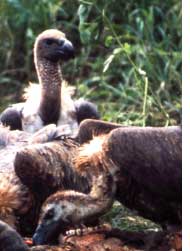Not all died of poisoning
 Avian malaria also responsible for decline in vulture numbers
Avian malaria also responsible for decline in vulture numbers
diclofenac poisoning may not be the sole cause for the drastic decline of vulture populations in central and south India. A two-year long study says avian malaria had a part to play as well.
The population of the Indian white-backed vulture (Gyps bengalensis) suffered a decline of over 95 per cent between 1988 and 1999, making them critically endangered. It was found that the indiscriminate use of diclofenac, an anti-inflammatory veterinary drug, caused it to be concentrated in the bodies of the vultures that fed on dead animals. Death was due to renal failure, a known side-effect of the drug.
The study was conducted in Gadchiroli district of Maharashtra where farmers had no resources to purchase or use diclofenac. Between 2004 and 2006, a hundred vultures inhabiting 48 nests spread across 11 villages were monitored. Examination of blood smears taken from dead vultures revealed the presence of Plasmodium sp AP70. This causes avian malaria. Two live but sick birds were also found displaying malarial symptoms. These birds were administered anti-malarial drugs which led to full recovery. No diclofenac residues were found in them.
Related Content
- Order of the National Green Tribunal regarding pollution being caused in the Kotwan Industrial area, Mathura district, Uttar Pradesh, 04/10/2023
- Joint committee report on the dumping of sewage in the green belt area, Ansal estate, Loni, Ghaziabad, Uttar Pradesh, 21/11/2022
- Breathing, in a time of pollution
- Six workers die in steel unit gas leak in Andhra Pradesh
- East African lions dying of poisoning
- Don’t pollute my future! The impact of the environment on children’s health
